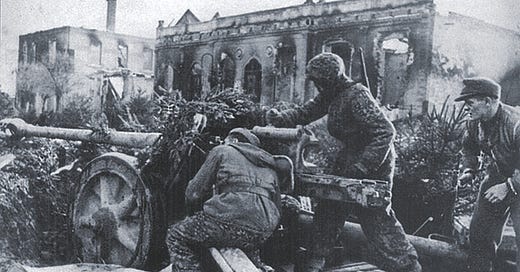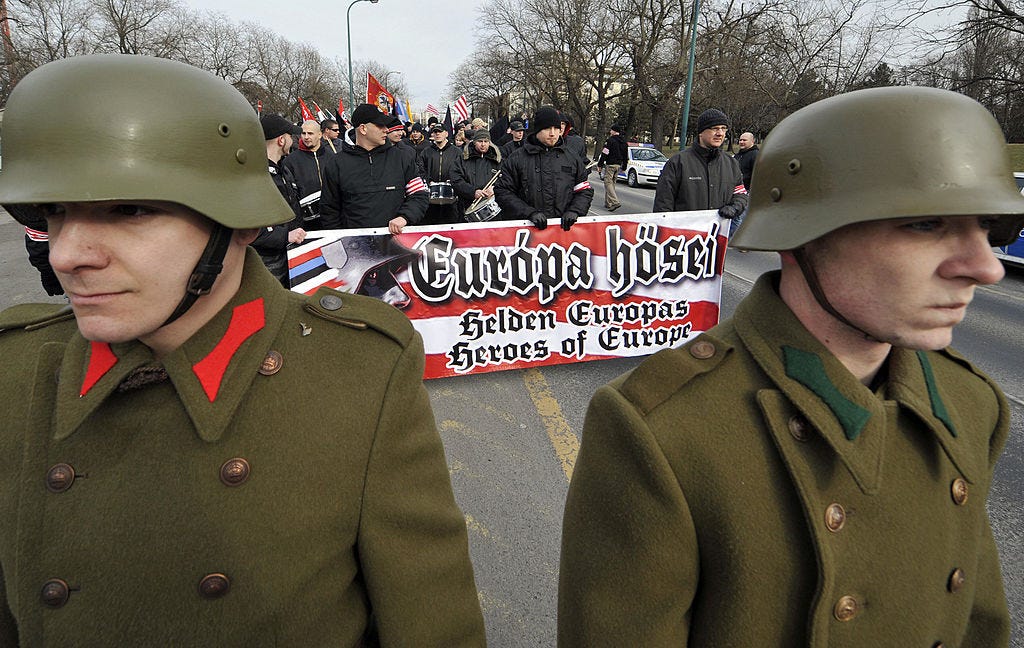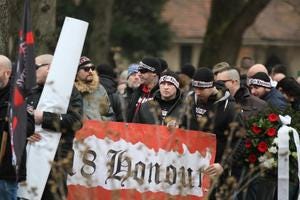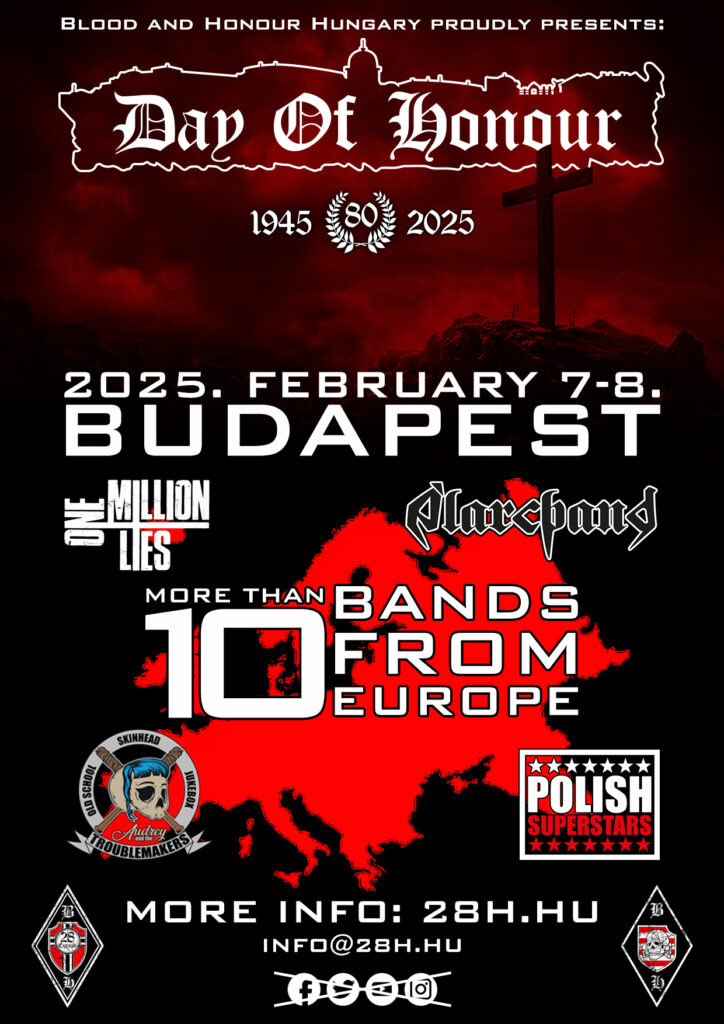Day of Honour 2025, Budapest
Or how neonazis love to cosplay being SS warcriminals every year in Budapest
Every February 11th dozens of neonazis from around Europe descend on Budapest to commemorate the “valiant and heroic” fight the Waffen-SS and their Hungarian fascist friends organized against the Soviet forces in 1945. The SS, ordered even by Hitler to surrender, decided to fight their way out of a Soviet siege of Buda castle where thousands of SS men and their Hungarian counterparts had the choice to surrender, starve or fight their way out to link up with German lines further down the road. And as their effort failed miserably and the SS were taken apart by the Soviets the event burned itself into the collective European neonazi memory as a day to not be forgotten.
After the fall of the Berlin Wall nationalist and neonazi movements started sprouting up across Eastern and Central Europe. Especially Hungary, with its past connections to Nazi-Germany never really addressed, became a fertile ground for neonazi groups. Most of these groups were movements with violent, beer guzzling skinheads who loved to get into fights with leftists and immigrants. But some groups had a little more substance to them and decided to incorporate Hungarist ideals into their political foundation. Hungarism was not new and had been a local form of National-Socialism before the war engulfed Europe. A rare form of expansionist nationalism Hungarism incorporates the ideas of a strong nation-state based on ethnicity, Christianity and agrarianism with trying to bring back the old borders of the Austrian-Hungarian Empire, bringing back ethnic Hungarians into a “greater-Hungary”. This “greater-Hungary” also happens to include other ethnic minorities that are seen as part of some larger ethnic mythology which puts the Hungarians or Magyar at the top of the food chain for the larger part of Central-Europe, even going as far as seeing the Turks as a familial ethnic group. The latter resulting in Hungarian nationalist parties wanting to have closer ties to Turkey and in particular Erdogan, which deviates strongly from other nationalist and conservative parties across Europe who want nothing to do with Turkey.
In 1997 Istvan Gyorkos, a Hungarian neonazi who had declared himself the Duce of Hungary, organized the first “Day of Honour”. The day included a march through Budapest “honoring” the SS and Hungarian soldiers who had died during the “Siege of Budapest”. It soon became a yearly event that attracted hundreds of neonazis from across Europe and the United States as Hungarian laws against openly supporting Nazi-Germany were not implemented. This meant that people could openly wear nazi-uniforms in a bizarre form of cosplay. Seeing a bunch of out of shape German and Hungarian neonazis dressed in SS and Wehrmacht uniforms doing a “hike” up to Buda castle just doesn’t quite seem historically accurate.
While in the late nineties the neonazis clashed with police forces as the local government tried to curtail the nazi-celebrations, after the elections that put Orban into power the “Day of Honour” actually became a government sponsored event. Subsidies were allocated to make sure the celebrations were well organized and the police were told to make sure that the marches throughout Budapest could be done in peace. This meant that the police became the official protector of the “Day of Honour” and that security forces cracked down on antifascist protests targeting the marches and meetings.
The “Day of Honour” became even more popular in the 2010’s and several days were allocated for marches, speeches, commemorations and neonazi rock concerts. Blood&Honour, an extremely violent neonazi skinhead group that is banned in most countries, became the main organizer of all concerts surrounding the “Day of Honour” which attracted dozens of violent neonazi groups alligned to Blood&Honour from around the world to come to Budapest. Together with the neonazi hooligans of the Legio Hungaria, violent neonazi groups from Germany and several Hammerskin groups from France and Italy, Blood&Honour organizes dozens of concerts and mixed martial arts events across Europe in an effort to create an international violent underground force of armed and dangerous neonazis that are willing to challenge the State.
Orban, and his friends from Fidesz and Jobbik, do not seem to be very worried about neonazis gathering and organizing in Budapest. As said before, they even subsidize the events. But that is not where Orban’s support stops. Not only has Orban supported multiple groups that have neonazi or Hungarist ideologies as their main driving force, he has also supported the fight against “globalistm” and antifascism. Forces from the “left” are in Orban’s eyes out to destroy Hungary, Christianity and want to force “communism” and “LGBTQ-ideology” on European society. These views have throughout the years led to controversial decisions by Orban and his government making Hungary a pariah in the European Union. But as long as Orban is in power in Hungary he does not feel threatened. But this changes every time hundreds of antifascists descend on Budapest to challenge the “Day of Honour”.
Orban has instructed Hungarian security forces to make sure the antifascists do not get any space to interrupt the celebrations of the “Day of Honour”. Police uses extreme violence to disperse antifascist protests, they arrest protestors en masse and the Justice Department will go to any lengths to prosecute protestors.
In 2023, during the week of the “Day of Honour” celebrations, several Hungarian and German neonazis were assaulted by antifascists outside of venues where neonazi meetings were being held. Noone was severly injured but the Hungarian Justice Department got the signal from above to go above and beyond to prosecute the antifascists involved in the altercations. This lead to a (wo)man-hunt across Europe for alleged perpetrators of the assaults. Several well-known antifascists from across Europe were arrested and jailed while still in Hungary while others were put on a most wanted list for European police agencies.
One of the more well-known people who was arrested was the Italian politician Ilaria Salis, now an MEP. She was arrested in Hungary for participating in the assaults on the neonazis and was put in pre-trial detention for 15 months in conditions described as disgusting with her not being allowed to wash for days. She was released only after she was elected in 2024 to the European parliament which granted her immunity from prosecution to the chagrin of the Hungarian government. Salis recieved no support from her own Italian government throughout her ordeals as the government of Melloni and Salvini has strong friendly ties to Orban in Hungary and Salis fears that when her time as an MEP is up after her five year term she will still be extradited to Hungary for trial where she could face 11 years in prison.
Besides Salis, other antifascists from Italy and Germany, with their Hungarian comrades, have been arrested and face extradition to Hungary. Italian-Albanian antifascist Gino was arrested in November 2024 in Paris and is awaiting an extradition trial and appeal in a French prison. German antifascist Maja T was already extradited from Germany to Hungary last summer and German authorities are in the process of considering extradition of another German antifascist called Hanna. The arrest of another antifascists Johann G is possibly also related to an international arrest warrent from Hungary even though Germany probably wants to prosecute against Johann for antifascist actions in Germany itself before extraditing him to Hungary. Hungary has over a dozen other arrest warrants outstanding against German, Syrian, Italian and Albanian antifascists for attempted murder and membership of a far-left organization. Some European courts have decided against extradition because of the horrid prison conditions in Hungary but it seems that European adversity with Hungary is not that important when it comes to dealing with left-wing activists. Especially Germany, who wants to be seen as cracking down hard on antifascist groups, seems to be very willing and able to send its own citizens to Hungarian prisons even though politically Germany condemns the state of democratic institutions in Hungary.
The European Parliament has been trying to force Hungary to cancel the “Day of Honour” celebrations in Budapest for years now. And in response the Hungarian institutions have repeated a tried and tested song and dance routine to please the European Parliament. It goes like this: the police in Budapest bannes the celebrations because of the risk of public disturbance by the march and counter-protests. The organizers of the “Day of Honour” then go to court and the Supreme Court decides that the celebrations should get the green light because the constitution does not allow for events like this to be banned and thus the “Day of Honour” continues as planned.
On the websites of Blood&Honour the “Day of Honour 2025” has been announced and even the names of the bands playing at some of the concerts that week are mentioned. The website refers people to a Telegram channel for more information as they don’t want to give antifascists too much of a heads-up. In the meantime it doesn’t seem that Orban and his government have any intention of banning the celebrations. So it seems that in February 2025 we can expect another display of neonazis in cosplay marching down the streets of Budapest. No doubt there will be dozens of antifascist there to make their day a little less enjoyable.









